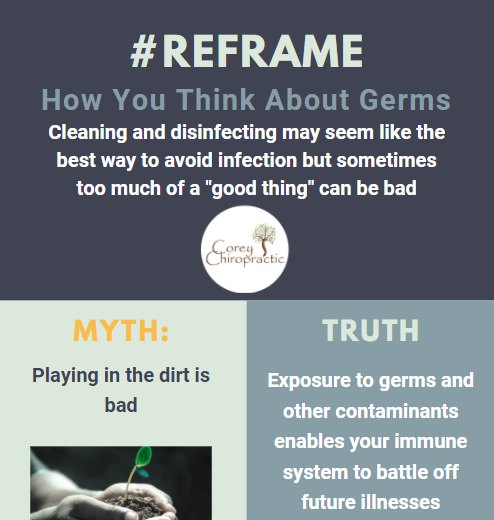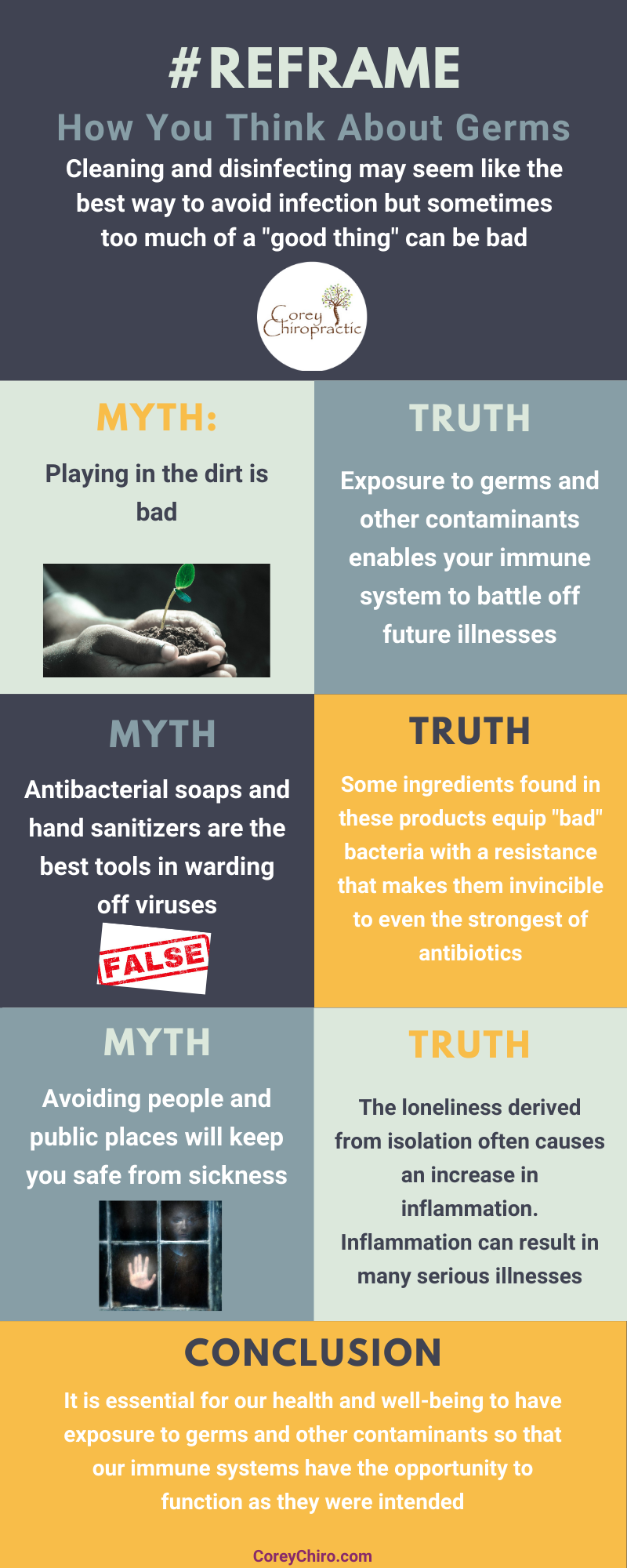
#Reframe How You Think About Germs
We’ve been programmed to think and act in certain ways by our antecedents. “Don’t touch that, it might be dirty!” “Don’t play with them, they might be sick!” “I don’t want you playing in the dirt!” Many scientists, health professionals, and researchers agree that society as a whole has become obsessed with cleanliness and sanitization efforts. We know our predecessors’ hearts were in the right place when they instilled these ideas in us, but it needs to be said that over-cleanliness and other infection suppression efforts actually damage the immune system.
Being too clean can make you sick in the long run. And before you start arguing with me, I am NOT telling you to stop washing your hands after using the restroom, to send little Johnnie to a sleepover with ebola-infected kids, or to eat off of a dirty kitchen floor. I am saying that if we do not allow our immune systems to function as they were intended, they will naturally forget how to function properly. Dr. John Craven DC, PhC said, “It is now maintained by the best authorities, among those who previously asserted that germs were the cause of dis-ease, that dis-ease may be the cause of the germs.” We’ll touch on that, too.
I get it. You don’t want someone coughing in your face. You’d rather your child not roll around in that dirt. And touching things in public places might give you the heebie-jeebies. But check this out! In able to fight off infection, the immune system must train by fighting off contaminants found in everyday life. Systems that aren’t exposed to contaminants have trouble with the heavy lifting of fighting off infections. So, by over-cleaning, over-protecting, and isolating, you actually weaken your immune system and can potentially end up with the opposite result than the one you were seeking. Please note that regular use of hand sanitizer and antibacterial soap contribute to this irony as well. In September of 2017, the FDA issued a rule saying that over-the-counter consumer antiseptic soap products containing certain ingredients can no longer be marketed to the general public. This is because those ingredients also kill good bacteria that live on our skin that we need to survive and repeated use of them may cause the remaining bacteria to develop a dangerous resistance. These resistant bacteria, known as “super bugs,” can develop properties that allow them to be invincible against most antibiotics that we have to treat infections.
Did you know that social isolation can also make you sick? Research shows that loneliness and isolation often result in increased inflammation. Inflammation is when your body tells your immune system to produce chemicals to fight off infection or injury. The theory behind this is that loneliness causes social/psychological stress and stress has been proven to increase inflammation. As we know, inflammation is the source of a grand spectrum of ailments including, but not limited to, cancer, heart disease, rheumatoid arthritis, type 2 diabetes, and even Alzheimer’s disease.
Our conclusion? While it’s ok to be cautious of over-exposure, it is vital to our health and well-being to have a healthy level of exposure to germs and other contaminants. This gives our immune systems the chance to develop a “memory” of those particular microbial pathogens with a corresponding enhanced readiness to combat them at a later time. It is also of utmost importance to venture out into the world… do not isolate yourself for the psychological trauma of loneliness can make you sick, too. We are constantly striving to keep our patients as informed as possible because your wellness is our number one priority at Corey Chiropractic. Thanks for reading.
#reframe #chiropractic #getadjusted #weloveourpatients

References:
futuregenerationssd.com/reclaiming-your-natural-immunity
lifewest.edu/dan-murphy-book-review-an-elegant-defense
webmd.com/parenting/features/how-clean-hygiene-germs#1
sciencealert.com/social-isolation-linked-to-higher-levels-of-inflammation-says-new-study
https://www.baptist-health.com/the-fda-soap-and-superbugs
